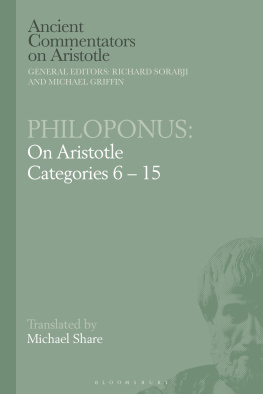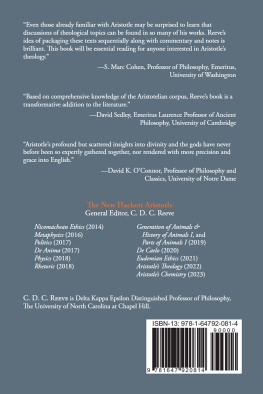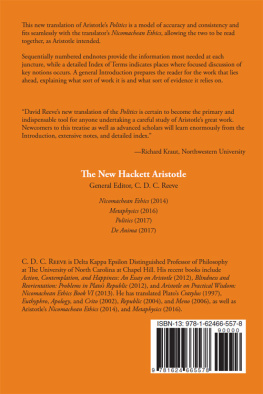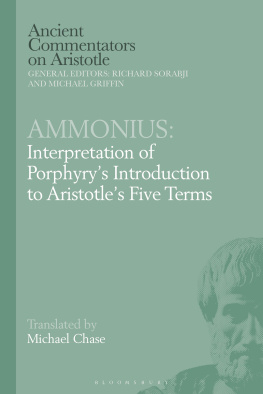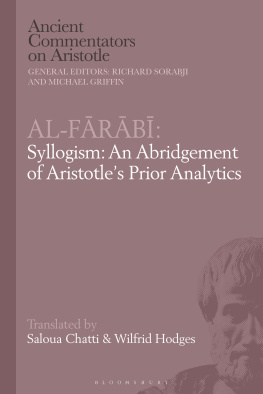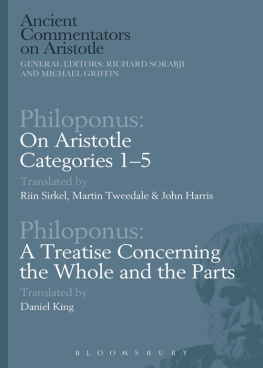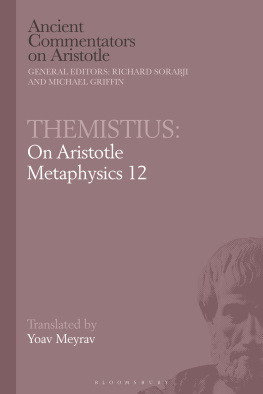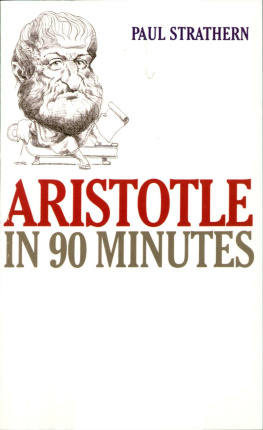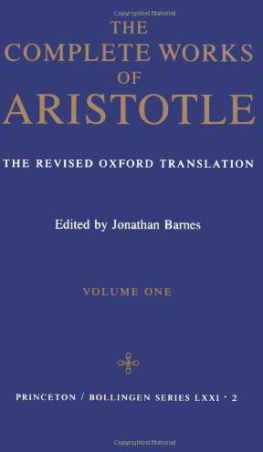
Philoponus
On Aristotle
Categories 615
Ancient Commentators on Aristotle
GENERAL EDITORS: Richard Sorabji, Honorary Fellow, Wolfson College, University of Oxford, and Emeritus Professor, Kings College London, UK; and Michael Griffin, Assistant Professor, Departments of Philosophy and Classics, University of British Columbia, Canada.
This prestigious series translates the extant ancient Greek philosophical commentaries on Aristotle. Written mostly between 200 and 600 AD, the works represent the classroom teaching of the Aristotelian and Neoplatonic schools in a crucial period during which pagan and Christian thought were reacting to each other. The translation in each volume is accompanied by an introduction, comprehensive commentary notes, bibliography, glossary of translated terms and a subject index. Making these key philosophical works accessible to the modern scholar, this series fills an important gap in the history of European thought.
A webpage for the Ancient Commentators Project is maintained at ancientcommentators.org.uk and readers are encouraged to consult the site for details about the series as well as for addenda and corrigenda to published volumes.

Acknowledgements
The present translations have been made possible by generous and imaginative funding from the following sources: the National Endowment for the Humanities, Divison of Research Programs, an independent federal agency of the USA; the Leverhulme Trust; the British Academy; the Jowett Copyright Trustees; the Royal Society (UK); Centro Internazionale A. Beltrame di Storia dello Spazio e del Tempo (Padua); Mario Mignucci; Liverpool University; the Leventis Foundation; the Arts and Humanities Research Council; Gresham College; the Esme Fairbairn Charitable Trust; the Henry Brown Trust; Mr and Mrs N. Egon; the Netherlands Organisation for Scientific Research (NOW/GW); the Ashdown Trust; the Lorne Thyssen Research Fund for Ancient World Topics at Wolfson College, Oxford; Dr Victoria Solomonides, the Cultural Attach of the Greek Embassy in London; and the Social Sciences and Humanities Research Council of Canada. The editors wish to thank John Dillon, Paolo Fait, Sebastian Gertz, Andrew Smith, Sten Ebbesen for their comments; Dawn Sellars for preparing the volume for press; and Alice Wright, Publisher at Bloomsbury Academic, for her diligence in seeing each volume of the series to press.
Contents
[] Square brackets enclose words or phrases that have been added to the translation for purposes of clarity.
() Round brackets, besides being used for ordinary parentheses contain transliterated Greek words.
| Ackrill | J.L. Ackrill (tr.), Aristotles Categories and De Interpretatione, Oxford: Clarendon Press, 1963. |
| Ammonius (or Amm.) | Ammonius in Cat. |
| Busse | A. Busse, Philoponi (olim Ammonii) in Aristotelis Categorias Commentarium, CAG 13.1, Berlin: Reimer, 1898. |
| CAG | Commentaria in Aristotelem Graeca, 23 vols, Berlin: Reimer, 18821909. |
| Cohen and Matthews | S. Marc Cohen and Gareth B. Matthews, Ammonius, On Aristotles Categories, London: Duckworth, 1991. |
| Heath | Thomas L. Heath, The Thirteen Books of Euclids Elements: Translated from the Text of Heiberg, 2nd edn, Cambridge: Cambridge University Press, 1926. |
| LSJ | H.G. Liddell and R. Scott (comps), A Greek-English Lexicon, rev. H. Jones; with a New Supplement, 9th edn, Oxford: Clarendon Press, 1996. |
| Lampe | G.W.H. Lampe (ed.), A Patristic Greek Lexicon, Oxford: Clarendon Press, 1961. |
| Philoponus (or Philop.) | Philoponus in Cat. |
| Sirkel, Tweedale and Harris | Riin Sirkel, Martin Tweedale, and John Harris, Philoponus, On AristotleCategories 15; with Daniel King, Philoponus, A Treatise Concerning the Whole and the Parts, London: Bloomsbury, 2015. |
| TLG | Thesaurus Linguae Graecae. |
Four of Philoponus seven Aristotelian commentaries are described in their titles as his notes from Ammonius seminars. it is much more likely that they were made by Philoponus.
An examination of the part of Philoponus translated in the present volume reinforces Lunas findings. On the one hand there is, as anticipated, a considerable amount of verbal agreement between the two commentaries and I have identified about eighty pairs of passages showing such agreement.
He gives additional reasons for Aristotles treating quantity second after substance (83,684,4).
He adds a long excursus on line, surface, and body (84,986,10). (But he omits Ammonius report that some people say that there are really only three species of quality at the corresponding point.)
He adds the argument that place and time are not continuous quantities in their own right (86,1287,20).
He adds an alternative explanation for Aristotles not counting motion as a species of the continuous (87,2532).
He adds a stone as an example of a thing with internal parts with relative position (88,224).
Unlike Ammonius (or Aristotle himself), he includes speech among things that exhibit natural order (89,79).
He adds a statement that inner language is, if anything, a quality of the soul (90,57).
He adds comments on the common boundary at which the parts of the body meet (91,415).
He adds an explanation of why quantity cant be defined and a description of how Aristotle looks for its distinctive feature as a substitute (93,1728).
He greatly expands on the statement that large and small and many and few are relatives (94,1031).
He adds a lengthy discussion of why there are no indefinite quantities (95,996,22).
He adds a lengthy excursus on (i) the correct use of large and small, long and short, and many and few, and (ii) whether Aristotle uses many and few consistently (98,499,15).
He expands Ammonius six lines on the non-occurrence of up and down in nature by a further twenty-one lines (99,26100,15).
He adds the point that quantities are receptive of contraries and counters some supposed exceptions to the rule that quantities have no contraries (101,919).
He adds a paragraph on the possibility of calling the category the relative in the singular (103,517).
He adds additional examples. And he seems to understand the interpretation of relatives reported by Ammonius differently from Ammonius himself (103,1831).
He expands Ammonius account of Protagorean relativism, adding extra examples and referring to Aristotles refutation of it as well as to Platos (103,31104,25).
He adds that relatives have no being of their own but occur in other categories and that they have been likened to suckers or to mutually supporting logs (104,2836).
He adds a paragraph on the verbal expression of relationship, which Ammonius only deals with later (105,1929).
He adds an analysis of the difference between positions and items in the category being positioned (107,718).
He criticizes Aristotle for saying that virtue and vice and knowledge and ignorance are relatives. They would be relatives under the first definition of relatives, but under it items in the nine categories of accidents would all be relative to substances (108,31109,26).
Next page
